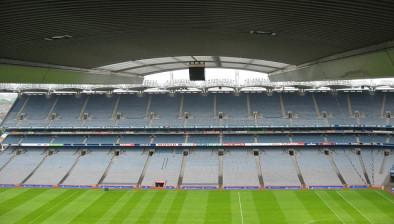High Court: Injunction granted against quarry near conservation area
The High Court has granted an injunction against a quarry operating near the Leannan River Special Area of Conservation (SAC).

About this case:
- Citation:[2020] IEHC 349
- Judgment:
- Court:High Court
- Judge:Mr Justice Anthony Barr
Background
Donegal County Council sought an interlocutory injunction pursuant to the Planning and Development Act 2000 s.160, restraining P Bonar Plant Hire Ltd T/A Bonar’s Quarry from further work at a quarry situated at Calhame, Letterkenny, Donegal.
Patrick Joseph Bonar, a director of Bonar’s Quarry, accepted that An Bord Pleanála refused permission for the carrying out of quarrying works at the site. He said that Bonar’s Quarry complied, and ceased all quarrying and related activities in an area of the site, which he has called the “extended area”. He said that Bonar’s Quarry continued to quarry the rest of the site, which he alleged had been used as a quarry prior to 1 October 1964, and that the operation of the quarry had not intensified to such an extent as to amount to a material change in use that would require planning permission.
In 2003, the previous quarry operator, Mountain Top Quarry Ltd, applied for retention and extension of the existing quarry. An Bord Pleanála refused permission, stating that any future application should include an environmental impact statement.
Mountain Top provided information for registration of the quarry under s.261 of the Planning and Development Act 2000 in 2005. In 2006, it applied for retention permission for removal of topsoil and extension of the quarry, accompanied by an Environmental Impact Statement. In 2008, An Bord Pleanála granted planning permission, with a condition stating that the permission was to operate the quarry for a period of five years “unless a separate permission for a further duration has been granted within this period”.
In 2012, Mountain Top applied to Donegal County Council for an extension of the duration of the 2008 permission, and an extension of the 2008 permission until 9 June 2018 was granted.
In 2014 Bonar’s Quarry took over operation of the quarry. In 2018, it applied to Donegal County Council for the continuation of quarrying activities for a period of 10 years, covering the entire quarry site. Planning permission was granted by Donegal County Council in July 2018, but a third-party appeal was lodged with An Bord Pleanála.
The 2008 planning permission expired on 9 June 2018. Bonar’s Quarry ceased works at the quarry as of that date. In April 2019, An Bord Pleanála refused planning permission for the continuation of quarrying activities because it was not satisfied that the development would not adversely affect the integrity of the Leannan River SAC located 3.5 km away. Further, it found the Environmental Impact Assessment Report submitted inadequate.
While there was no quarrying for an initial period, quarrying operations recommenced on the site in April 2019. Members of the public complained to the County Council.
In June 2019, an Enforcement Notice was issued to Bonar’s Quarry requiring the cessation of quarrying within six weeks, which was not complied with. District Court summonses issued in February 2020 in respect of the alleged offence of non-compliance with the enforcement notice, which was adjourned due to the pandemic.
Bonar’s Quarry’s “clearly stated intention” as expressed by Mr Boner was to continue operating the quarry so as to fulfil its contractual commitments until it was in a position to commence operations at a new quarry in September 2020.
Architect Michael Friel, in support of Bonar’s Quarry, averred that on the expiry of the planning permission in June 2018, Bonar’s Quarry reverted to the pre-1964 quarry while all operations in the extended area ceased. He referred to Fingal County Council v William P Keeling & Sons Ltd [2005] IESC 55 where the court held that where an application for planning permission was refused, the making of such an application did not disentitle the applicants from maintaining that the development was in fact an exempted development. While an application for retention permission was made, Bonar’s Quarry did not accept as a matter of law that this acted as a bar, or form of estoppel, preventing it from relying on the status of the quarry prior to 1 October 1964. Mr Friel said that abandoning the quarry, without the proper grading of the rock face, would represent a potential serious health and safety issue. He stated that the County Council had not dealt adequately, or at all, with the repercussions arising.
Mr Justice Barr referred to the test in Campus Oil v Minister for Industry and Energy [1983] IR 82, which established that the court must ask three questions: is there a serious question to be tried; are damages an adequate remedy and where does the balance of convenience lie?
The court considered Limerick County Council v Tobin [2005] IEHC 281, wherein Mr Justice Michael Peart considered whether to grant interlocutory relief pursuant to s.160 of the Act of 2000, in respect of the operation of a quarry, where the respondent relied on an alleged pre-1964 user of the lands as a quarry. In granting the relief sought, the court said that even though the respondent may, and in all probability would, suffer some losses by the granting of interlocutory relief pending the hearing of this case, it was a loss which would be quantifiable in the event that the respondent was correct and could prove his case.
The court considered Ms Justice Marie Baker’s dicta in McCoy & South Dublin County Council v Shillelagh Quarries Ltd & Others [2015] IEHC 838, which concerned an argument that the works and activity at the quarry had commenced prior to 1964. Ms Justice Baker noted that there was a public interest, in relation to quarries, in ensuring that their operation was carried on in a lawful manner. She held that where the likelihood of further damage to the environment had been established, the public interest in the observance of environmental legislation and of determinations made by the competent authorities was a weighty imperative.
Conclusion
“The respondent, through Mr Bonar, has articulated a clear intention to flout the planning laws and the environmental provisions contained therein, until it can carry on its commercial activities at another location.”
The court found that if it were to refuse the granting of an injunction, it would be “encouraging a person to flout the planning laws, which are designed to protect the public interest and would be ignoring the environmental issues which clearly arise in this case, given the nature of the works carried on at the site and its proximity to the Leannan River SAC, with possibly permanent and irreversible adverse consequences thereto.”
Mr Justice Barr was satisfied that the balance of justice lay in favour of the grant of interlocutory injunctive relief against Bonar’s Quarry.









